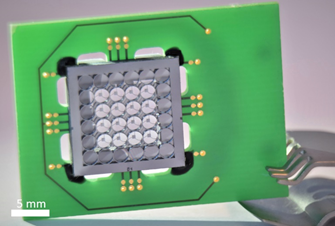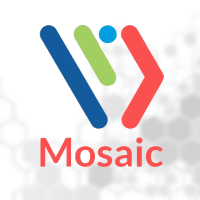Acronym : DOCT-VCSEL
Project’s leader (in FEMTO-ST): N. Passilly
Partnership : LAAS (Toulouse, Coordinator), FEMTO-ST, CHU Saint-Etienne
DOCT-VCSEL: 4x4 Array of miniature Mirau interferometers with actuated reference mirrors for OCT applications
Abstract :
DOCT-VCSEL aims at demonstrating and implementing a new generation of MEMS-VCSEL swept-sources emitting at 850 nm and their integration in a highly miniaturized OCT system for skin pathologies detection.
Cutaneous cancer is currently the most commonly diagnosed type of cancers and its early diagnosis increases the chances of successful treatment. Although existing optical coherence tomography (OCT) systems can perform non-invasive optical biopsies of skin, they remain bulk and expensive, essentially affordable at the hospital and hence not sufficiently employed by physicians or dermatologists as an early diagnosis tool.
VCSEL (vertical-cavity surface-emitting laser) technology can provide a combination of high speed, high coherence length, and flexibility for swept-source OCT systems whereas robust micro-optical components can be fabricated thanks to MOEMS technologies. The DOCT-VCSEL architecture thus relies on an array of Mirau interferometers - interesting for their vertical arrangement compatible with vertical assembly at the wafer-level - and a swept-VCSEL developed by LAAS partner. The developed system is based on a full-field approach, applied in each channel of an array of interferometers, allowing to image large area despite limited field-of-view intrinsic to microfabricated devices, i.e. without the need of large optics. It also avoids the use of fast and often expensive laser sources, since many pixels are used simultaneously instead of a single point detector.
The aim of DOCT-VCSEL project is to demonstrate a handheld and potentially low-cost OCT microsystem, enabling doctors to perform painless and early detection of skin pathologies.
Funding agency : ANR TecSan
Grant or funding obtained : 666 k€ (200k€ for FEMTO-ST)
Start and end dates : 05/2016 – 03/2021

